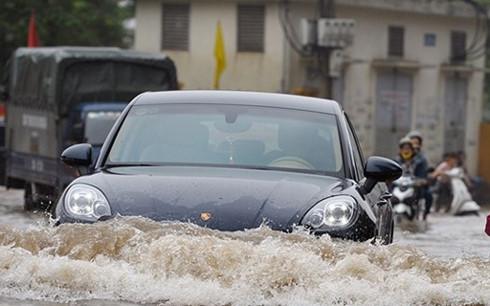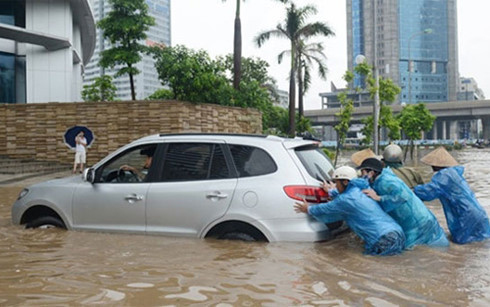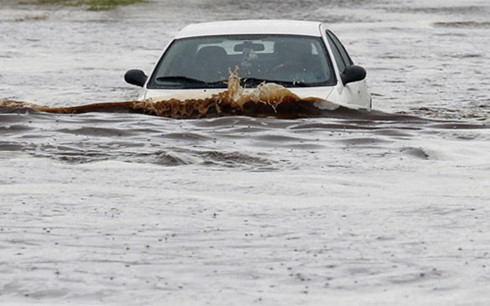Tips for escaping when driving through flooded areas
When having to go through flooded areas, drivers should use low gear and keep the accelerator steady to avoid water entering the exhaust pipe and causing the engine to stall.
A common problem that cars encounter when driving through flooded roads is hydro-locking - a phenomenon in which water enters the air intake, causing the car to suddenly stop. If the driver tries to start the car after hydro-locking, the damage will be even more severe. Many cars can lose up to 30% of their value due to this problem.
 |
| Prolonged rainy weather causes many roads to be flooded. If cars move through deeply flooded areas, they can easily stall. |
The main cause of water hammer in cars is when the driver tries to start the engine when the car is flooded. At this time, water will flood into the air intake (air intake) of the engine, causing the car to stall or damage other parts of the car.
Another cause that can lead to hydrolock in cars is due to some parts inside the engine being damaged, such as the cylinder head gasket. Then, coolant will leak into the engine if the car accidentally moves into flooded areas.
The third cause of water hammer is a damaged fuel injection system or carburetor.
Therefore, for 4-seat cars, when you see a flooded road, deeper than about thirty centimeters, you should not go in. If you want to go, at least make sure that the water in the flooded section is not higher than the air intake of your car. Moreover, you must always keep a steady throttle to ensure that water does not flow into the exhaust pipe.
In particular, some people think that going through a flooded area must be done very quickly, which is a big mistake. Even though the road is flooded and the water is not as high as the air intake, when the car moves, it will create waves with other cars, and the water can still splash in. Therefore, when going through a flooded area, you must press the accelerator hard enough, but not too fast.
In case water gets into the exhaust pipe, do not panic because the water in the exhaust pipe actually clogs the engine, causing it to stall but not enter the engine. Therefore, if the driver stays calm, wades in, has enough people to help push the car through the flooded area, and then starts the engine, the engine can still continue to operate as usual.
 |
| If you accidentally turn off your engine while in the middle of a flooded road, do not try to start the car. This will cause more damage to the car. |
If you notice that the engine oil has turned rice water or a strange color, it means that water has entered the engine. Instead of starting the car, you should push the car out of the flooded area and quickly disconnect the battery cable. Then call a tow truck for assistance.
For cars that have been flooded and stalled, drivers should not continue to start the engine because water can easily cause the engine to seize. If the engine is damaged, cars that cost 500-700 million VND usually cost around 10-15 million VND to repair.
When having to go through a flooded area, you must first determine whether the water level is shallow or deep and whether the vehicle is an SUV or a sedan. Normally, if the water level is not more than 20 cm, the vehicle can move through safely. When going through a flooded area, the driver must not open the door to avoid water from flooding the vehicle. With a sedan, the intake manifold is placed low, you can open the hood, remove the air filter, lift the cover to go through safely, then reinstall and continue moving. With the current state of potholes, potholes, gas pipes... on the roads in urban areas, when flooded, they will become "traps" for drivers because they cannot see the road surface. In addition, when moving in the rain, it will reduce the ability to observe signs and moving vehicles.
 |
| Walking in the middle of the road helps avoid deep flooded areas. |
In all road surface designs, the middle will be the highest and gradually decrease towards the outside, so the closer the vehicle is to the middle of the road, the less likely it is to be flooded. In addition, the closer to the outside, the higher the risk of entering a pothole, sinkhole or manhole, and can suddenly cause the vehicle to be flooded deeply, possibly causing the engine to stall.
When driving in flooded areas, drivers should slow down and watch the vehicle in front. This will help control the vehicle easily and also watch the vehicles in front to avoid potholes that the vehicle in front encounters. In addition, drivers should not drive near large trucks because they will create sudden large waves, which can flood the intake or exhaust pipes, causing the engine to stall.
When driving through flooded areas, you should turn off all unnecessary auxiliary equipment such as: air conditioning system, sound system... to reduce the load on the engine to avoid sudden engine failure.
One more thing drivers need to keep in mind is to always save a traffic rescue phone number in their contacts for use in case of emergency./.
According to VOV
| RELATED NEWS |
|---|

.jpg)
